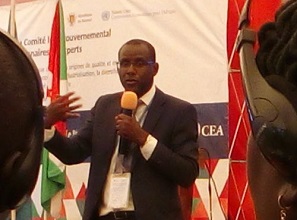By Andualem Sisay Gessesse (Bujumbura, Burundi) – Linking and merging Ethiopian Commodity Exchange (ECX) with the East African Commodity Exchange (EAX), African countries are advised to introduce a single regional agricultural commodity exchange.
The creation of linkages between the two major commodity exchanges will facilitate the implementation of the African Continental Free Trade Area (AfCFTA), according to Professor Issouf Soumare, who presented a paper at a sub-regional meetings of senior government officials and experts in Bujumbura, Burundi last week.
“A single regional commodity exchange where all commodities produced in the region could be traded represent a great opportunity to meet the main objective of AfCFTA, which are fostering regional integration, eliminating tariff and non-tariff barriers on commodities, as well as Improving competitivity and quality” he said.
He stated that Africa specifically the east Africa region has significant and various agricultural commodities which can be traded on a regional commodity exchange. Somalia, Comoros, Burundi, and Ethiopia are the top 4 countries in the region with a high share of agriculture in GDP. In these 4 countries, agriculture represents more than 30% of the GDP, which the professor argued can be taken as a good opportunity to formalize and deepen intra-Africa agriculture products trading between African countries by introducing a regional commodity exchange and benefit from the AfCFTA.
East African countries can “leverage the existing exchanges in the region by exploring the possibility to merge them into one entity with national subsidiary in each country,” he said recommending the establishment of a single regional commodity exchange by merging all existing national commodity exchanges that cover all types of tradable products and clients.
“The approach of merging all existing national commodity exchanges is aligned with the structure of most existing international commodity exchanges and will be cost efficient,” he said. Among the befits of having one African commodity exchanges he mentioned include easy connection of smallholders (producers, farmers) to local and regional markets; better price discovery and transparency which could help market participants to make real-time informed decision.
It will also result in the improvement of quality of products sold on the market through the warehousing system of grades and standards. In addition, a regional commodity exchange can also support the overall economic development by creating jobs, providing better risk coping mechanisms, and improving income for all market participants, according to Professor Issouf Soumare.
The advantages he also mentioned include are:
– Implementation cost will be reduced for each member country participating by pooling resources and expertise.
– Market liquidity will improve with a higher volume of traded products and more participants. A broader market can have a positive impact on the demand side and increase revenue for producers/farmers, particularly smallholders.
– More financial inclusion of producers/farmers allowing them to access financial resources to finance their production on a large scale
One of the major challenges of introducing a single regional commodity exchange he the professor mentioned is moving beyond national-specific interests: “With national-specific interests at play, it could be challenging to establish a single regional commodity exchange in the region,” he said.
The other challenges he mentioned include:
– Harmonization of countries’ legislations could be a challenge as well.
– Creation of a regional warehousing receipt system with infrastructure upgrading across countries in the region could be very challenging as countries in the region are not at the same level of development.
– Price volatility may be an issue as farmers and producers do not control the prices of their respective products which are not a function of production costs, but instead vary with offer and demand.
Government interference
One of the most important governance conditions for a successful commodity exchange is the level of government interference in setting commodity market prices, according to Professor Issouf Soumare. “The role of governments in a regional commodity must be limited to setting-up the legal/regulatory framework and putting in place the regulatory body without no other interference in normal market functioning.”
“Regional authorities should also ensure that the legal/regulatory body plays its role of market oversight by effectively enforcing the legal/regulatory framework. The general principles of strong market regulation and the specific principles for commodity exchange developed by the International Organization of Securities Commissions (IOSCO) can contribute,” he said.
“In sum, a regional commodity exchange in the region will represent a great opportunity for the successful implementation of AfCFTA as it will foster regional integration and promote intra-regional trade by eliminating trade barriers on commodities traded on this market,” said Professor Issouf Soumare, who is also a founder of Soumare University and Lecturer in Canada.
The meeting of the Intergovernmental Committee of Senior Officials and Experts (ICSOE) was held in Bujumbura, Burundi from 25 – 28 September 2023 by bringing together experts and government officials from eastern and central African countries. Organized by the UN Economic Commission for Africa Kigali – based sub regional office, this year’s meeting took place under the theme: “Building Central and East Africa as sources of quality products and investment destinations of choice, to accelerate industrialization and economic diversification, and to strengthen food security”.

